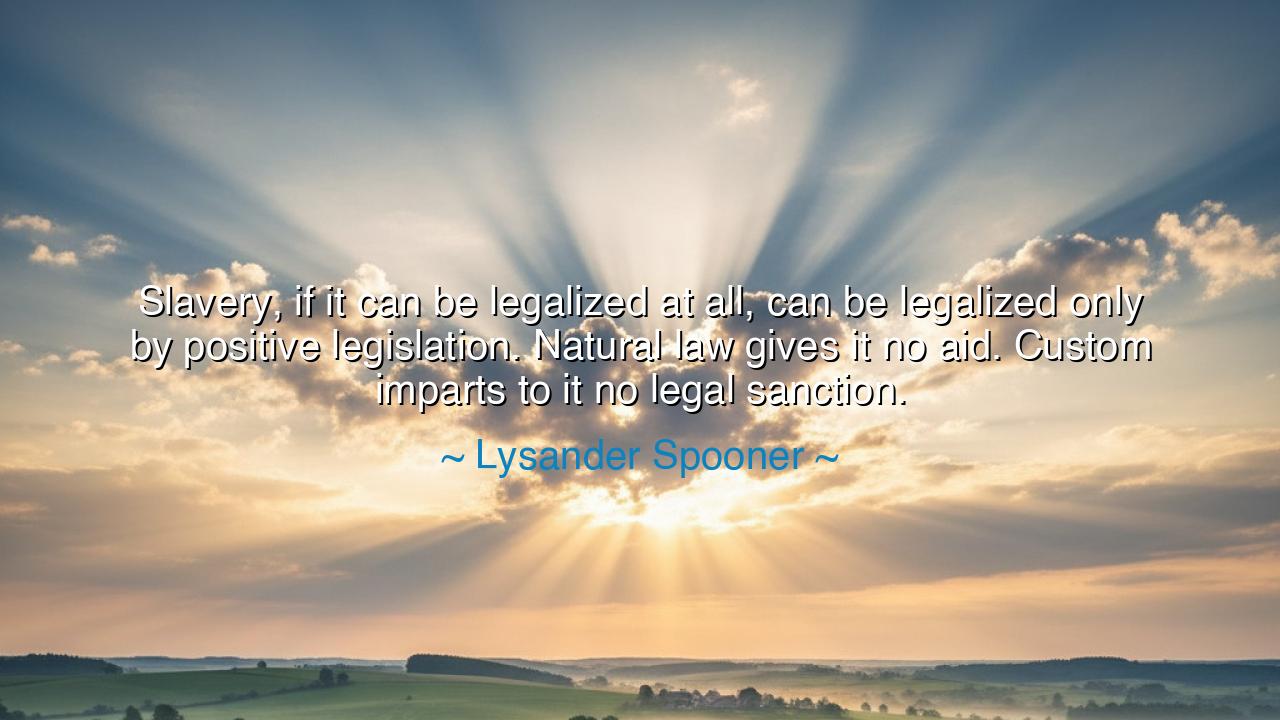
Slavery, if it can be legalized at all, can be legalized only by
Slavery, if it can be legalized at all, can be legalized only by positive legislation. Natural law gives it no aid. Custom imparts to it no legal sanction.






Hear the fiery words of Lysander Spooner, a man of unyielding conscience and piercing logic: “Slavery, if it can be legalized at all, can be legalized only by positive legislation. Natural law gives it no aid. Custom imparts to it no legal sanction.” This is not merely a statement of law, but a thunderclap of moral truth. It is the voice of one who gazed upon the abomination of slavery and stripped away every excuse, every veil, declaring that no eternal law, no ancient tradition, no universal truth could ever bind one human being in chains to another.
The meaning of this quote rests in the sharp contrast between natural law and positive legislation. By natural law—the law written upon the human heart, the law of reason, justice, and equality—slavery has no foundation. Nothing in nature gives one man rightful dominion over the body and soul of another. By custom, too, it gains nothing; the mere repetition of an evil over generations does not transform it into righteousness. Therefore, Spooner declares, if slavery exists at all, it must be by the hand of legislators who craft unjust statutes, forcing into the lawbooks a practice that nature and morality eternally reject.
The origin of these words lies in the fires of the American debate over slavery in the mid-19th century. Spooner, an abolitionist and radical thinker, penned these words in opposition to those who claimed that slavery was rooted in history, religion, or even the Constitution itself. To him, these arguments were hollow. He insisted that freedom is the natural condition of man, and that the only way slavery could survive was through deliberate acts of government—positive legislation—which twisted law into an instrument of oppression rather than justice. His words revealed slavery not as an ancient truth but as a political crime.
History itself illustrates his point. Consider the Fugitive Slave Act of 1850, where Congress decreed that runaway slaves must be returned to their masters, even from free states. Here was positive legislation in its darkest form: the written law used not to protect liberty, but to enforce bondage. Yet the natural law rebelled—abolitionists defied the act, the Underground Railroad flourished, and the conscience of the people rose against it. The law of man clashed with the law of nature, and in time, it was the natural law that triumphed in spirit, if not without blood.
The lesson is thunderous: evil can never clothe itself in the robes of legitimacy simply by being written into statutes or practiced by tradition. What is unjust remains unjust, even when endorsed by parliaments, courts, or kings. Natural law—the law of justice, dignity, and equality—must always stand as the higher measure. Slavery teaches us that when human law departs from this eternal standard, it ceases to be law in the true sense and becomes instead a tool of tyranny.
What then must we do? We must never accept injustice merely because it has been long practiced or written into codes of law. We must question every statute, every custom, by the light of higher truth: does it honor the dignity of man? Does it uphold liberty and equality? If it does not, then it is not law but corruption. As Spooner did, we must be ready to stand against both custom and legislature when they betray conscience.
Thus, let Lysander Spooner’s words echo through the ages: “Slavery can be legalized only by positive legislation. Natural law gives it no aid.” Teach this to future generations—that no tradition, no decree, no statute can sanctify oppression. Let them know that law must always serve justice, and justice must always honor the freedom of the human soul. For the chains of slavery, whether of body, mind, or spirit, find no sanction in the eternal law of nature, and must be broken wherever they are found.






AAdministratorAdministrator
Welcome, honored guests. Please leave a comment, we will respond soon